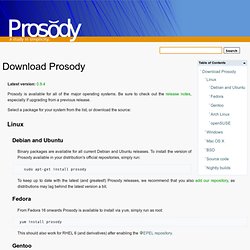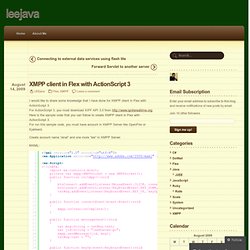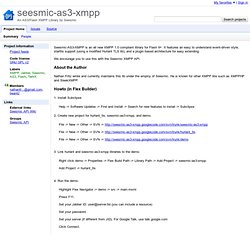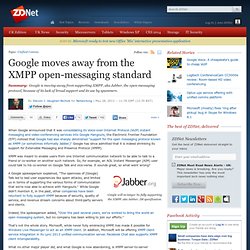

Download Prosody - Prosody.im. Latest version: 0.9.4 Prosody is available for all of the major operating systems.

Be sure to check out the release notes, especially if upgrading from a previous release. Select a package for your system from the list, or download the source: Linux Debian and Ubuntu Binary packages are available for all current Debian and Ubuntu releases. Sudo apt-get install prosody To keep up to date with the latest (and greatest!) Fedora From Fedora 16 onwards Prosody is available to install via yum, simply run as root: yum install prosody This should also work for RHEL 6 (and derivatives) after enabling the EPEL repository. Gentoo Arch Linux openSUSE Windows A Windows installer is also available. Download 0.9.4 Or you can download this zipped version.
Packages supporting Windows XP and 2003 coming in an updated package soon. Also, some addons are available. Mac OS X OS X users can use Homebrew to install the latest version of Prosody. Brew install Prosody is available for the various BSD flavours: XMPP with Tigase - Installation Recipes. XMPP servers use standard ports assigned by the Internet Assigned Numbers Authority (IANA).

For non-SSL (Secure Socket Layer) client access to XMPP servers, port 5222 must be enabled. For SSL client access, open port 5223. If you want your Tigase installation to be accessible from other servers, enable port 5269. If you plan to use BOSH, port 5280 must be open. For local area network installations, explicitly opening ports may not be necessary. Tigase's Graphical User Interface (GUI) installer is intended to be the fastest and most accurate way to install and configure the messaging server on a Linux machine with a GUI such as Gnome or KDE. In order to install and run Tigase 5, you must have the Java Development Kit (JDK) version 1.6. Orville@workstation:~$ java -version should return something like.
Hemlock. This documentation is a work in progress, but should be enough to get you started.

We just want to get the source code into your hands as soon as possible! Getting Started Hemlock is a framework for building real-time, multi-user web applications. It combines the speed and scalability of XMPP with the flexibility of HTML, CSS and JS. Read more about it on our blog. Before you begin developing with Hemlock, you'll need to set up ejabberd, a popular XMPP server. Ejabberd Installing ejabberd Hemlock uses ejabberd as an XMPP server. Virtual host or server domain: Enter localhost. After installing, add an alias to ejabberdctl in your ~/.profile or equivalent: # Assuming that you installed at /Applications/ejabberd-2.1: alias ejabberdctl="/Applications/ejabberd-2.1/bin/ejabberdctl" Once again, update this to correspond to your particular installation path as needed.
XMPP client in Flex with ActionScript 3. Package import flash.events.TimerEvent; import <span class="skimlinks-unlinked">flash.utils.Timer</span>; import <span class="skimlinks-unlinked">flash.xml.XMLDocument</span>;

Seesmic-as3-xmpp - An AS3/Flash XMPP Library by Seesmic. Seesmic-AS3-XMPP is an all new XMPP 1.0 compliant library for Flash 9+.

It features an easy to understand event-driven style, starttls support (using a modified Hurlant TLS lib), and a plugin based architecture for easy extending. We encourage you to use this with the Seesmic XMPP API. About the Author Nathan Fritz wrote and currently maintains this lib under the employ of Seesmic. Google moves away from the XMPP open-messaging standard. When Google announced that it was consolidating its Voice-over-Internet Protocol (VoIP) instant messaging and video-conferencing services into Google Hangouts, the Electronic Frontier Foundation (EFF) noticed that Google had also sharply diminished "support for the open messaging protocol known as XMPP (or sometimes informally Jabber.)

" Google has since admitted that it is indeed shrinking its support for Extensible Messaging and Presence Protocol (XMPP). XMPP was meant to enable users from one Internet communication network to be able to talk to a friend or co-worker on another such network. So, for example, an AOL Instant Messenger (AIM) user could talk to his co-worker on Google Talk and vice-versa. It sounds great, so what went wrong? A Google spokesperson explained, "The openness of [Google] Talk led to bad user experiences like spam attacks, and limited us in terms of supporting the various forms of communication that we're now able to achieve with Hangouts.
" Related Stories: